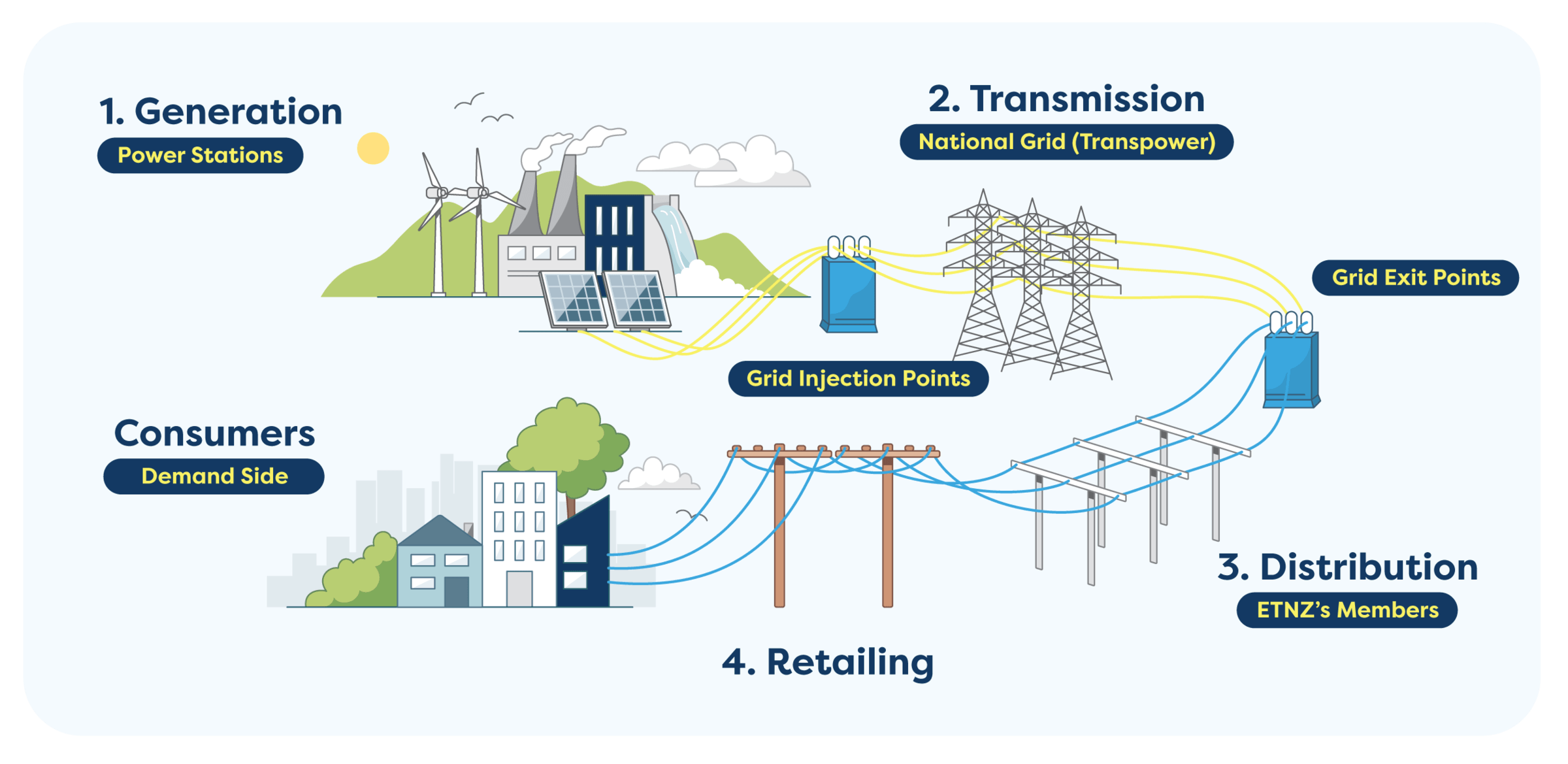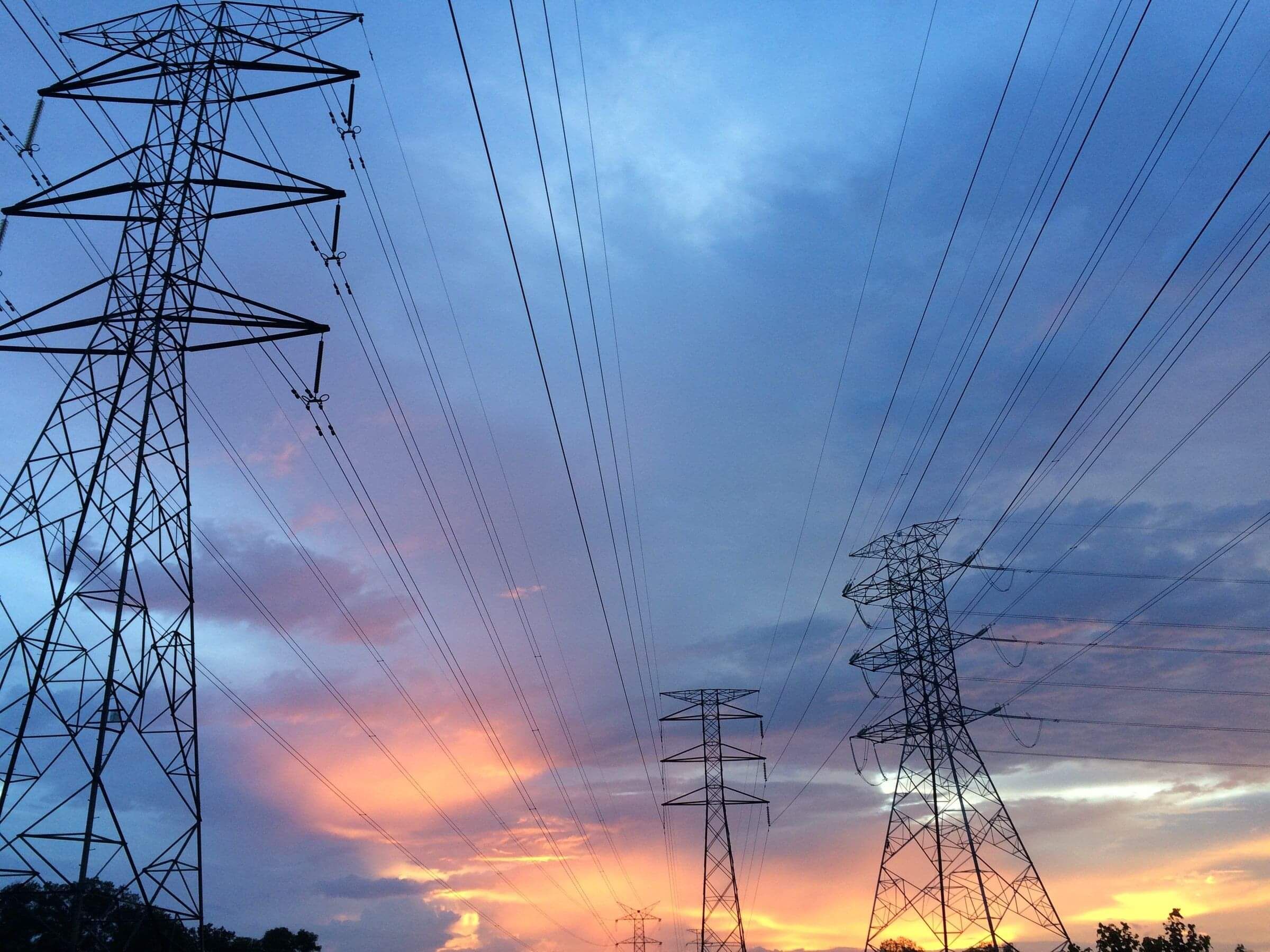Our Industry
ETNZ's member trusts own their local electricity distribution companies, forming the power distribution component of the energy supply chain. Collaborating with the broader energy sector, ETNZ also works closely with the Electricity Networks Association (ENA), which represents the interests of the country's electricity lines businesses - the lines sector.
Energy Industry Overview
The electricity industry in New Zealand has four main segments: generation, transmission, distribution, and retailing. A fifth segment, regulation, also plays a significant part.
We are also seeing the beginnings of a sixth segment, the demand side, involving developments and systems that empower consumers (such as solar power and battery storage, along with new pricing arrangements and new efficiency technologies).

1. Generation
Since the mid-1990's there have been four major power generators: Meridian, Contact Energy, Genesis and Mercury, when the state-owned conglomerate, ‘Electricity Corporation of New Zealand’ (Electricorp, later ECNZ) was broken up.
Most of the local power companies were forced by legislation to sell their generation assets as joint ownership of significant amounts of generation and distribution was no longer allowed. One of those power companies, Trustpower, opted to sell its distribution assets instead and to buy up a number of the small generation businesses. Another, Top Energy, obtained a special exemption that allowed it to retain the Ngawha geothermal generation plant in Northland.
Today, downstream technologies such as solar and wind power are opening up new opportunities for smaller generators down to the household level. Meanwhile, electricity supplied by the major generators is mainly sold through the wholesale electricity market (NZEM) overseen by the Electricity Authority, although a significant portion is sold direct to major industrial users such as the aluminium smelter at Bluff. Click here for more on generation with the MBIE electricity industry information portal.
2. Transmission
All electricity transmission services are provided by Transpower, a Crown company that owns and operates the ‘National Grid’ (the pylons and high voltage cables that bring electricity from major power stations to about 140 regional Grid Exit Points – GXPs – around the country). It was separated from the original Electricity Corporation conglomerate in the 1990s.
Transpower is unique in being allowed a guaranteed return on its approved investments, under a price control formula administered by the Commerce Commission, based on a Transmission Pricing Methodology set by the electricity Authority. For transmission live data see ‘Power System live data’
3. Distribution
Regional electricity distribution companies supply virtually all New Zealand households, along with the great bulk of commercial, industrial and farming customers, through local electricity distribution networks. They vary in size from Vector (owned by ETNZ member Entrust) with about 25% of the national distribution market, down to Buller (owned by the Buller Electric Power Trust) with around 1% of the market.Most distributors sell their lines services to the various electricity retailers operating on their networks.
All distribution companies must provide comprehensive performance and pricing data to the Commerce Commission, in accordance with strict information disclosure legislation. In addition, most are subject to price control, again administered by the Commerce Commission. Around 75% of New Zealand’s electricity distribution assets are wholly or majority owned by ETNZ member trusts. Local authorities in Christchurch, Dunedin, Invercargill and South Canterbury own or partially own the local distributors, while two companies are foreign-owned.
4. Retailing
Most New Zealand consumers buy delivered electricity from one of the major retailers owned by the big generators (i.e. from companies such as Meridian, Contact, Genesis etc.).
Around 15% of the market is supplied by around 30 independent retailers.
5. Regulation
There are two principal electricity industry regulators: the Commerce Commission, and the Electricity Authority.
The Commerce Commission regulates distributors’ prices and their supply quality (based mainly on the frequency and duration of outages).
It also controls the prices of Transpower and of most distributors. While Transpower is guaranteed price levels that recover its costs, distributors are subject to a separate control regime that exposes them to wider market risks.
In addition, there are various legislative controls on power quality and supply safety, and to a complex range of operational commitments administered by the Electricity Authority.
Industry Ownership and Relationships
Since the 1980s the electricity industry has changed greatly from a state-owned monopoly handling generation and transmission, and selling power at an annually set North Island and South Island price, to a range of local ‘power companies’ (and a few direct users, such as the rail system and the aluminium smelter, who received special rates).
The power companies were, essentially, the local retailers and distributors of electricity, delivering a combined energy and lines service to consumers. From 1982 the ownership structures of most of them were standardised through trusts created in accordance with the Energy Companies Act of that year.
In 1998-99 legislation required the local power companies to be broken up into separate energy retailers and distributors, with ownership of the latter – the Electricity Distribution Businesses, ‘EDBs’ or ‘line companies’ – largely being retained by the energy trusts. Those Trusts make up ETNZ’s members.


Energy Trusts and Their Companies
ETNZ's member trusts are responsible for ensuring that the electricity distributors they own operate as successful businesses. The trusts that own most of the lines industry on behalf of consumers or communities are not involved in day-to-day management. However, like any group of shareholders, they have rights to appoint suitably qualified directors to the boards of the companies they own, to ensure those directors meet expectations and to approve major transactions.
A key governance requirement is an annual Statement of Corporate Intent negotiation between each trust and its electricity distribution company, where the trust will set its expectations for the year. This may be used to evaluate directors’ performance when company boards are reviewed.
While some of the trusts have deeds and responsibilities which are similar, trust structures are varied and may include community trusts, consumer trusts and in some cases shared company ownership arrangements.
All energy trusts must comply with the various legal requirements set out in the Trustee Act 1956 (likely to be replaced by a new Trusts Act now being developed). Other legislation such as the Energy Companies Act 1992 also creates specific reponsibilities for ETNZ members.
INDUSTRY COLLABORATION
Working With ENA and EEA
ETNZ works closely with the Electricity Networks Association (ENA) which represents the interests of the country's electricity lines businesses - the lines sector. ENA's trust-owned members range in size from Vector, with about 540,000 consumer connections, down to Buller Electricity, with about 4,500.
A small number of ENA’s members are owned by local authorities rather than trusts, or are privately owned. Information sharing between the two organisations is encouraged, and the ETNZ Executive Committee exchanges views with the ENA Board from time-to-time.
We also have a relationship with the Electricity Engineers’ Assciation (EEA) and recognise the scope for liaison on some issues with parallel organisations such as the Institute of Directors, the New Zealand Trustees’ Association, and Cooperative Business NZ. The distribution companies owned by all ETNZ’s member trusts belong the industry complaints scheme operated by the Electricity Disputes Commissioner. The distribution companies owned by all ETNZ’s member trusts belong the industry complaints scheme operated by the Electricity Disputes Commissioner.

Energy Trusts of New Zealand Incoporated
The collective voice of consumer-owned power distribution in New Zealand.
P.O.Box 5819, Dunedin 9054
secretary@etnz.org.nz
Cathie Bell | Stakeholder Manager
cathie.bell@etnz.org.nz
MEMBERS ONLY SITE
Rules and Legislation
Member Newsletters
Submissions
Conferences

